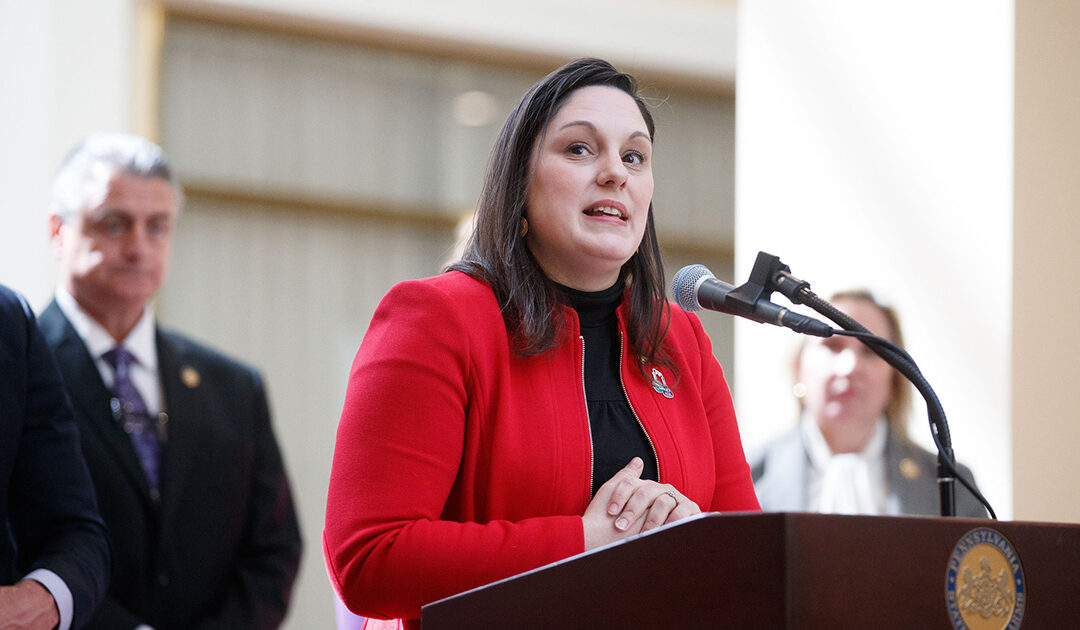Op-ed by Amanda Cappelletti
With the recent rise of oil and gas prices, we have heard a lot about how Pennsylvania should be an energy leader. We can be. We should be. And it should be clean energy – a move that increases job opportunities, economic development, and places us at the forefront of addressing the climate crisis.
Report after report illustrates the dire state of our environment. This year’s Intergovernmental Panel on Climate Change report made it clear – we must act now to avoid the very worst impacts of climate change.
Science shows the uptick in destructive weather events is connected with the warming of our planet. In August of 2021, my district felt the effects of extreme weather.
Hurricane Ida brought flooding and destruction to areas of the commonwealth that have historically never flooded. Homes were ruined, cars totaled, and communities left in disbelief that such a severe natural disaster could happen in their community. Over $100 million dollars of damage was caused, enough for President Joe Biden to declare a major disaster in Pennsylvania. Economists predict damages caused by climate change could cost $1 trillion dollars, with other research predicting the U.S. could potentially lose $2 trillion in growth by 2100 if we do nothing to curb greenhouse gases.
I hear every day that my constituents want action on climate change. And it’s not just my district, in fact, a Franklin and Marshall poll from June 2021 found the majority of Pennsylvania registered voters think the state should work harder to tackle climate change. Pennsylvanians want action, and so do I.
But Republicans, who control the voting agenda, are obstructing action.
In 2019, Gov. Tom Wolf jump-started the process for Pennsylvania to join the Regional Greenhouse Gas Initiative (RGGI), a commonsense carbon cap and invest program that requires companies who have greatly contributed to our climate crisis to take responsibility for their role by limiting their emissions and investing in the inevitable transition to clean energy.
Currently eleven states participate in RGGI and have generated millions of dollars that are being invested in a transition to clean energy, environmental justice communities, and weatherization projects that can protect homes and communities from the devastation of a natural disaster.
Unfortunately, my Republican colleagues can only focus on the interests of corporate friends in fossil fuel and natural gas. They have used every tool at their disposal to block RGGI and keep Pennsylvania from moving toward a cleaner, healthier future without proposing any alternatives that will protect us and our environment.
In addition to RGGI, I have joined colleagues from the Senate and House to call for Go PA 100, legislation. As a prime sponsor of the bill, I ensured that it not only puts Pennsylvania on track to reach 100% renewable energy by 2050, but it does so in a way that ensures job security for those transitioning from oil and gas to the renewable energy industry.
We can invest in green energy to better the health of Pennsylvanians, our economy, and the overall future our commonwealth. Yet we continue to be challenged and blocked by anti-environment government officials who fight tooth and nail to maintain the status quo. A status quo where we are not improving Pennsylvania but continuing to live with a climate crisis that is literally killing people and will only get worse.
Some Republicans call this “environmental radicalism,” but really these solutions simply embrace the future. It is not radical to want clean air and water.
It is not radical to propose programs that generate investments in people, jobs, infrastructure, and the future of the economy. It is not radical to invoke long-term thinking when crafting policy. I would argue that Pennsylvanian’s prefer their leaders think in the long term as they govern. In fact, I know all of this to be true because Pennsylvanians passed a constitutional amendment obligating the state to protect the environment.
The same Republicans who inaccurately throw around the term “environmental radicalism,” also argue that money was “lost” in Pennsylvania because projects were halted to prioritize the health and safety of Pennsylvanians. Have they considered how much money was saved by not putting the health and safety of Pennsylvanians at risk?
A pro-clean energy future prioritizes the health of Pennsylvanians and saves them money. The Pennsylvania Department of Environmental Protection (DEP) projects better, cleaner air from the impact of RGGI, and will save between $232 and $525 million in annual health costs. Data from Stanford University’s Solutions Project shows a move to 100% percent clean energy could result in over $21 billion in avoided health costs per year. That’s billions of dollars Pennsylvanians can use for something other than being sick.
Embracing clean energy can also bring better jobs and better pay to workers across the commonwealth. According to an E2 jobs report, clean energy remains the biggest job creator across America’s energy sector and in 2020, 35% of all energy sector jobs in Pennsylvania were in clean energy, nearly twice as many as fossil fuels. We have the right foundation to be a clean energy leader.
What do we want the future of Pennsylvania to be? I want it to be healthy, thriving, and an example of putting people over short-term corporate interests. Since the 18th century, industries have evolved, innovated, and adapted to account for the needs of society. Change can be scary, but it also keeps us moving forward. In this case, we can either move forward or do nothing while our planet dies.
So no, wanting to implement solutions to fight the climate crisis is not radical environmentalism. This is leadership working with the constituents they represent to address tangible problems we all face.
This is an example of looking at the bigger picture – not corporate interests or short-term inconveniences. This is action that can make a profound difference for our economy and health. Proposals to help our environment are backed by data and modeling that shows investments will lead to growth.
Pennsylvanians deserve an honest dialogue about what interests are really driving the climate debate in our state. I’m fighting for health, sustainability, and future generations. If corporate interests and political gain are your motive, what a disappointment.

